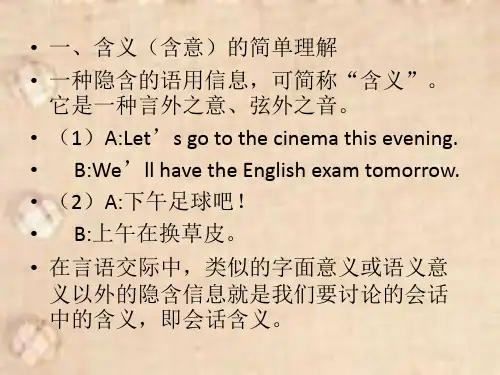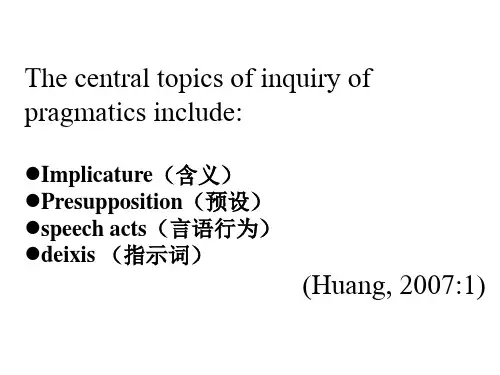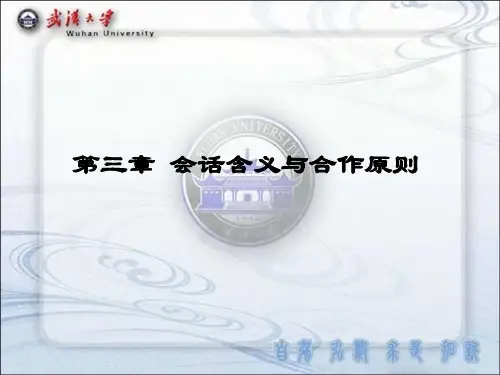语用学之会话含义PPT课件
- 格式:ppt
- 大小:2.61 MB
- 文档页数:36
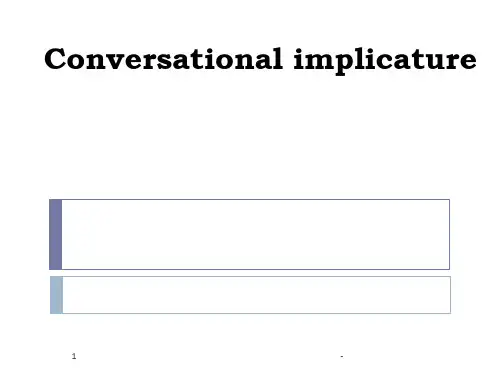
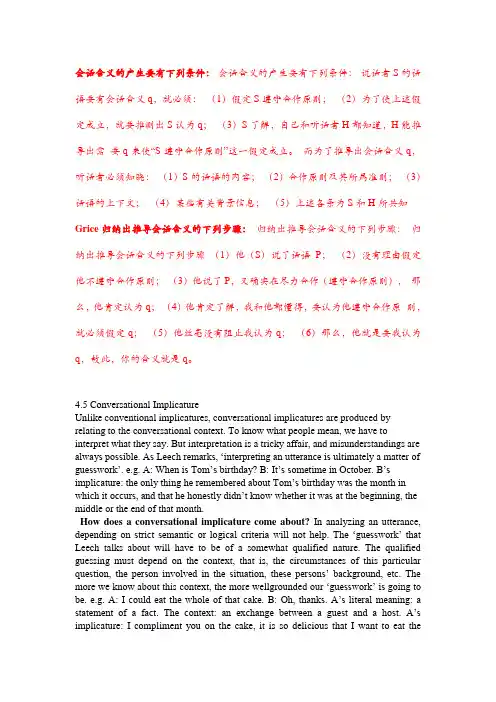
会话含义的产生要有下列条件:会话含义的产生要有下列条件:说话者S的话语要有会话含义q,就必须:(1)假定S遵守合作原则;(2)为了使上述假定成立,就要推测出S认为q;(3)S了解,自己和听话者H都知道,H能推导出需要q来使“S遵守合作原则”这一假定成立。
而为了推导出会话含义q,听话者必须知晓:(1)S的话语的内容;(2)合作原则及其所属准则;(3)话语的上下文;(4)某些有关背景信息;(5)上述各条为S和H所共知Grice归纳出推导会话含义的下列步骤:归纳出推导会话含义的下列步骤:归纳出推导会话含义的下列步骤(1)他(S)说了话语P;(2)没有理由假定他不遵守合作原则;(3)他说了P,又确实在尽力合作(遵守合作原则),那么,他肯定认为q;(4)他肯定了解,我和他都懂得,要认为他遵守合作原则,就必须假定q;(5)他丝毫没有阻止我认为q;(6)那么,他就是要我认为q,故此,你的含义就是q。
4.5 Conversational ImplicatureUnlike conventional implicatures, conversational implicatures are produced by relating to the conversational context. To know what people mean, we have to interpret what they say. But interpretation is a tricky affair, and misunderstandings are always possible. As Leech remarks, ‘interpreting an utterance is u ltimately a matter of guesswork’. e.g. A: When is Tom’s birthday? B: It’s sometime in October. B’s implicature: the only thing he remembered about Tom’s birthday was the month in which it occurs, and that he honestly didn’t know whether it was at the begin ning, the middle or the end of that month.How does a conversational implicature come about? In analyzing an utterance, depending on strict semantic or logical criteria will not help. The ‘guesswork’ that Leech talks about will have to be of a somewhat qualified nature. The qualified guessing must depend on the context, that is, the circumstances of this particular question, the person involved in the situation, these persons’ background, etc. The more we know about this context, the more wellgrounded our ‘guesswork’ is going to be. e.g. A: I could eat the whole of that cake. B: Oh, thanks. A’s literal meaning: a statement of a fact. The context: an exchange between a guest and a host. A’s implicature: I compliment you on the cake, it is so delicious that I want to eat thewhole of it. e.g. A: Where is my box of chocolates? B: I was feeling hungry. I have got a train to catch. Where is your diet sheet? The children were in your room this morning. B’s semantic meanings: nonsense B’s intended meanings: He has eaten the chocolates as he was hungry. He took the chocolates as he got a train to catch. He hid the chocolates as he knew that A was on diet. (to lose weight, A should not eat them.) He suggested that the chocolates might be eaten by the children. Conclusion: The intended meanings of different speakers are not drawn from semantic or logical content of language, but are drawn from conversatinal implicature which tries to explain language use from functional, communicative and contextual aspects rather than from linguistic aspects which include phonology, syntax and semantics. Question: Why don’t people just say what they mean so as to avoid all ‘guesswork’ and ‘misunderstanding’? __ the way language users go about their communicative businesses Communication is not a matter of logic or truth, but of co-operative; not of what people say, but of what they can say under certain circumstances. According to Grice, the reason why people don’t say what they mean is that they try to be cooperative by observing certain rules in communication so as to make communication smooth and successful. 在言语交际中,一句话的全部意义,即有意图的信息交有意图的信息交流内容应作下列图式分解(Levinson,1983:131):流内容非自然意义(=有意图的信息交流内容)字面意义含义规约含义非规约含义非会话含义会话含义一般性会话含义特殊性会话含义由这个图式可以清楚地看到,Grice 认定“非自然意义”是由字面意义含义两部分共同组成字面意义和含义字面意义含义的。




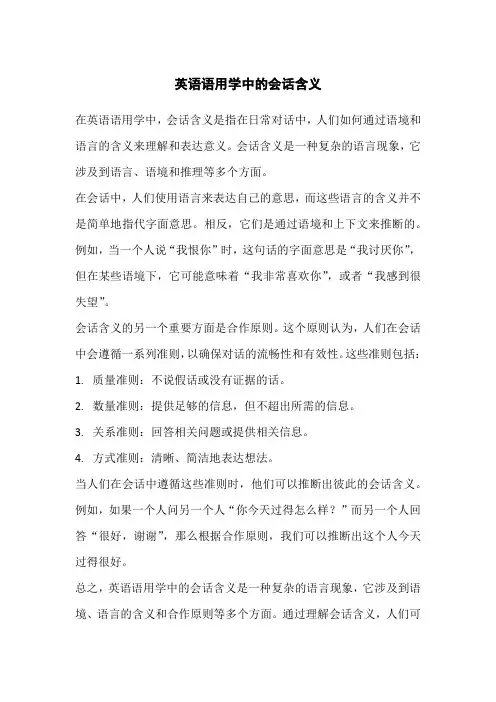
英语语用学中的会话含义
在英语语用学中,会话含义是指在日常对话中,人们如何通过语境和语言的含义来理解和表达意义。
会话含义是一种复杂的语言现象,它涉及到语言、语境和推理等多个方面。
在会话中,人们使用语言来表达自己的意思,而这些语言的含义并不是简单地指代字面意思。
相反,它们是通过语境和上下文来推断的。
例如,当一个人说“我恨你”时,这句话的字面意思是“我讨厌你”,但在某些语境下,它可能意味着“我非常喜欢你”,或者“我感到很失望”。
会话含义的另一个重要方面是合作原则。
这个原则认为,人们在会话中会遵循一系列准则,以确保对话的流畅性和有效性。
这些准则包括:
1.质量准则:不说假话或没有证据的话。
2.数量准则:提供足够的信息,但不超出所需的信息。
3.关系准则:回答相关问题或提供相关信息。
4.方式准则:清晰、简洁地表达想法。
当人们在会话中遵循这些准则时,他们可以推断出彼此的会话含义。
例如,如果一个人问另一个人“你今天过得怎么样?”而另一个人回答“很好,谢谢”,那么根据合作原则,我们可以推断出这个人今天过得很好。
总之,英语语用学中的会话含义是一种复杂的语言现象,它涉及到语境、语言的含义和合作原则等多个方面。
通过理解会话含义,人们可
以更好地理解和表达自己的意思。
